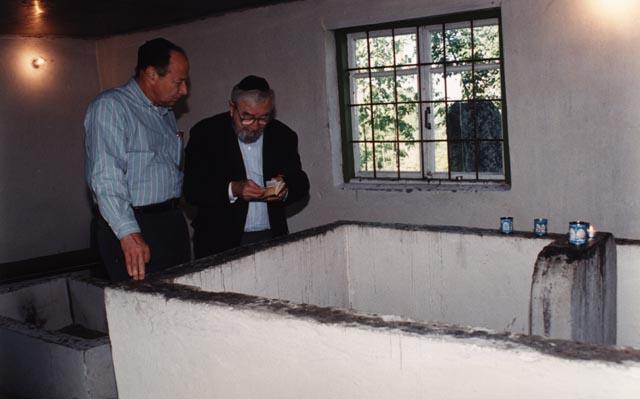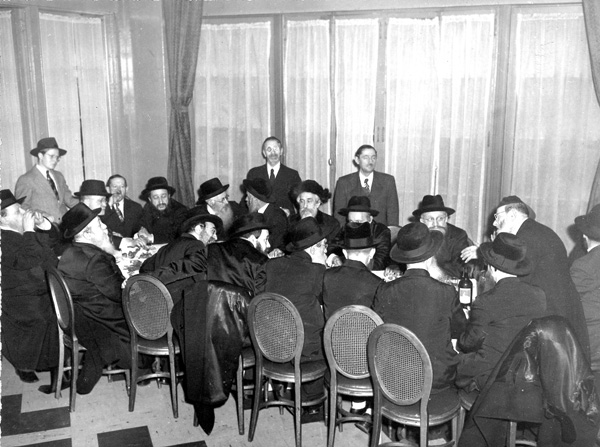Medzhibozh (Hasidic dynasty) on:
[Wikipedia]
[Google]
[Amazon]
 Mezhbizh (also spelled as Medzibuz, Mezbuz, Mez'buz, and in various other ways, transcribed from various
Mezhbizh (also spelled as Medzibuz, Mezbuz, Mez'buz, and in various other ways, transcribed from various
 Besides the position of the Mezhbizh dynasty as a "trunk" of
Besides the position of the Mezhbizh dynasty as a "trunk" of

Baal Shem Tov family tree
 Mezhbizh (also spelled as Medzibuz, Mezbuz, Mez'buz, and in various other ways, transcribed from various
Mezhbizh (also spelled as Medzibuz, Mezbuz, Mez'buz, and in various other ways, transcribed from various Yiddish
Yiddish (, or , ''yidish'' or ''idish'', , ; , ''Yidish-Taytsh'', ) is a West Germanic language historically spoken by Ashkenazi Jews. It originated during the 9th century in Central Europe, providing the nascent Ashkenazi community with a ve ...
dialects) is the name of the town of Medzhybizh
Medzhybizh, previously known as Mezhybozhe, population 1,731, (Census 2001) ( uk, Меджибіж, russian: Меджибож, Translit: ''Medzhibozh'', pl, Międzybóż, german: Medschybisch, yi, מעזשביזש, translit. ''Mezhbizh'') is ...
in the present Ukraine
Ukraine ( uk, Україна, Ukraïna, ) is a country in Eastern Europe. It is the second-largest European country after Russia, which it borders to the east and northeast. Ukraine covers approximately . Prior to the ongoing Russian inv ...
which is significant as both the source of a Hasidic dynasty that bears its name and as a symbolic name for the roots of Hasidism
Hasidism, sometimes spelled Chassidism, and also known as Hasidic Judaism (Ashkenazi Hebrew: חסידות ''Ḥăsīdus'', ; originally, "piety"), is a Judaism, Jewish religious group that arose as a spiritual revival movement in the territory ...
.
The Mezhbizh dynasty served as the earliest "trunk" of Hasidic Judaism
Hasidism, sometimes spelled Chassidism, and also known as Hasidic Judaism (Ashkenazi Hebrew: חסידות ''Ḥăsīdus'', ; originally, "piety"), is a Judaism, Jewish religious group that arose as a spiritual revival movement in the territory ...
, led by the Baal Shem Tov and his direct descendants.
The town of Mezhbizh in Hasidic history
The Mezhbizh dynasty is more than just a branch ofHasidic Judaism
Hasidism, sometimes spelled Chassidism, and also known as Hasidic Judaism (Ashkenazi Hebrew: חסידות ''Ḥăsīdus'', ; originally, "piety"), is a Judaism, Jewish religious group that arose as a spiritual revival movement in the territory ...
because it was the small town from where Hasidism
Hasidism, sometimes spelled Chassidism, and also known as Hasidic Judaism (Ashkenazi Hebrew: חסידות ''Ḥăsīdus'', ; originally, "piety"), is a Judaism, Jewish religious group that arose as a spiritual revival movement in the territory ...
eventually spread throughout the Jew
Jews ( he, יְהוּדִים, , ) or Jewish people are an ethnoreligious group and nation originating from the Israelites Israelite origins and kingdom: "The first act in the long drama of Jewish history is the age of the Israelites""T ...
ish communities of Eastern Europe
Eastern Europe is a subregion of the European continent. As a largely ambiguous term, it has a wide range of geopolitical, geographical, ethnic, cultural, and socio-economic connotations. The vast majority of the region is covered by Russia, whic ...
.
Geographically, the Hasidic movement originated in Mezhbizh, where the movement's founder, Yisroel ben Eliezer made his home, Beis Medrash
A ''beth midrash'' ( he, בית מדרש, or ''beis medrash'', ''beit midrash'', pl. ''batei midrash'' "House of Learning") is a hall dedicated for Torah study, often translated as a "study hall." It is distinct from a synagogue (''beth knes ...
(a synagogue and place of Torah study
Torah study is the study of the Torah, Hebrew Bible, Talmud, responsa, rabbinic literature, and similar works, all of which are Judaism's religious texts. According to Rabbinic Judaism, the study is done for the purpose of the '' mitzvah'' ("com ...
), held court, and is buried. He came to be known as the Baal Shem Tov
Israel ben Eliezer (1698 – 22 May 1760), known as the Baal Shem Tov ( he, בעל שם טוב, ) or as the Besht, was a Jewish mystic and healer who is regarded as the founder of Hasidic Judaism. "Besht" is the acronym for Baal Shem Tov, which ...
("master [of the] good name" in Hebrew) abbreviated as BESHT, a name that was given to various Jewish miracle workers in the Middle Ages.
The Hasidic dynasty of Mezhbizh
 Besides the position of the Mezhbizh dynasty as a "trunk" of
Besides the position of the Mezhbizh dynasty as a "trunk" of Hasidic Judaism
Hasidism, sometimes spelled Chassidism, and also known as Hasidic Judaism (Ashkenazi Hebrew: חסידות ''Ḥăsīdus'', ; originally, "piety"), is a Judaism, Jewish religious group that arose as a spiritual revival movement in the territory ...
, an important branch of Hasidism led by the Baal Shem Tov's descendants and heirs evolved from there as well.
The Baal Shem Tov's grandson, Boruch of Medzhybizh, Reb Boruch (known in his childhood as Reb Boruch'l, a Yiddish diminutive, and subsequently as ''Reb Boruch'l HaKadosh'') was the first "Rebbe#Hasidic Rebbe, rebbe" of the Hasidic movement to hold court in Mezhbizh in his grandfather's home and ''Beis Medrash'', which he inherited. He was the son of R' Yechiel Mikhl Ashkenazi and Udl, only daughter of the Baal Shem Tov.
As recorded in the early Hasidic work ''Mekor Boruch'' (first published in 1880 from handwritten manuscripts), at the time of the Baal Shem Tov's death, Reb Pinchos of Korets and Reb Yosef of Polonoe, two of the Baal Shem Tov's closest followers, reported to the Hasidim that the Baal Shem Tov had designated Reb Boruch as his successor, and instructed Reb Pinchos to take responsibility for carrying out those wishes. Reb Boruch was not yet bar mitzvah (under 13 years) at the time of his grandfather's death, and he was then taken to live in Reb Pinchos' home, where the Baal Shem Tov's other close Hasidim and other leaders of the Hasidic movement visited regularly to check on his progress and assist with his preparation to assume his grandfather's mantle.
Reb Boruch remained with Reb Pinchos of Korets until the ''Chevraya Kadisha'' ("holy circle"), as the close inner circle of the Baal Shem Tov was known, decided that he was ready to return to Mezhbizh and become "The Rebbe." When he finally returned to Mezhbizh, all of the Hasidic leaders of that time regularly visited Reb Boruch, including the Maggid of Chernobyl, the Dovber of Mezeritch, Magid of Mezritch, Reb Shneur Zalman of Liadi (founder of the Chabad-Lubavitch Hasidic movement), and others.
From Reb Boruch the mantle of leadership was inherited by his son-in-law Reb Yitzchok Drubitsher, who was a son of Reb Yosef of Yampil, Khmelnytskyi oblast, Yampol, the son of Reb Yechiel Michl, the Magid of Zlotshov. Reb Yitzchok's son, Reb Yechiel Michl (known as Reb Mekhl Drubitsher), succeeded him, followed by his son, Reb Mordechai. Both Reb Yechiel Michl and his son Reb Mordechai married descendants of the Chernobyl (Hasidic dynasty), Chernobyl Hasidic dynasty.
The last rebbe of this lineage to be born in Mezhbizh was Grand Rabbi Yaakov Yisroel Korff. Son of the last Mezhbizher Rebbe, Reb Mordechai, he was a direct descendant of the Baal Shem Tov and his grandson, Reb Boruch of Mezhbizh (the first Rebbe), and the Hasidic dynasties of the Rebbes of Mezhbizh, Chernobyl (Hasidic dynasty), Chernobyl, Karlin (Hasidic Dynasty), Karlin, Ruzhin (Hasidic dynasty), Ryzhin, and Apt. Reb Yaakov Yisroel married the daughter of the Zvhiller Rebbe of that time, Reb Yichiel Michl. He subsequently succeeded his father-in-law as Zvhiller Rebbe until his own father, Reb Mordechai of Mezhbizh died, after which he then became the Zvhil-Mezhbizh Rebbe, continuing the dynasty after his father, although he continued to be known as the Zvhiller Rebbe (see also Zvhil (Hasidic dynasty).
Lineage of the Mezhbizh dynasty
* 1. Rebbe YisroelBaal Shem Tov
Israel ben Eliezer (1698 – 22 May 1760), known as the Baal Shem Tov ( he, בעל שם טוב, ) or as the Besht, was a Jewish mystic and healer who is regarded as the founder of Hasidic Judaism. "Besht" is the acronym for Baal Shem Tov, which ...
(1698-1760) - founder of Hasidism
Hasidism, sometimes spelled Chassidism, and also known as Hasidic Judaism (Ashkenazi Hebrew: חסידות ''Ḥăsīdus'', ; originally, "piety"), is a Judaism, Jewish religious group that arose as a spiritual revival movement in the territory ...
** Rabbi Tsvi of Pinsk (died 1780) - (''son of the Baal Shem Tov''; did not serve as an admor).
*** Rebbe Aharon of Titiov (died 1800) – ''son of Rabbi Tsvi''.
**** Rabbi Hershl of Skver - ''son of Rebbe Aharon''
*** Rebbe Dov Ber of Ulaniv, Ulanov – ''son of Rabbi Tsvi''.
** Rabbi Yechiel Mikhl Ashkenazi of Tulchyn - married Udl, daughter of the Baal Shem Tov
*** 2. Rebbe Boruch of Medzhybizh, Boruch of Mezhbizh (1753-1811) - author of Butsina diNehoiro - (''son of Rabbi Yechiel Mikhl; son-in-law of R. Aharon of Titiov'').
**** Rebbe Yitschak Drubitsher (''son-in-law of Rebbe Boruch, son of Rabbi Yosef of Yampil, Khmelnytskyi Oblast, Yampol, son of Rabbi Yekhiel Mikhl of Zolochiv, Lviv Oblast, Zlotshev''; succeeded his father-in-law as rebbe in Mezhbizh).
*****Rebbe Yekhiel Mikhl (''son of Rebbe Yitschak; son-in-law of Rebbe Mordechai Twersky, Motl of Chernobyl (Hasidic dynasty), Chernobyl'')
******Rebbe Mordechai of Mezhbizh (''son of Rebbe Yekhiel Mikhl'')
*******Rebbe Yakov Israel Korff (''son of Rebbe Mordechai, son-in-law of Rebbe Yekhiel Mikhl of Zvhil-Korets'')
********Yitzhak Aharon Korff, Rebbe Itzhak Aron Korff (''grandson of Rebbe Yakov Israel'')
*****Rebbe Boruch Rabinovich of Iași, Yas
******Rebbe Eliezer Chaim of Skolye (died 1916) (the first rebbe in America) – son of Rebbe Boruch
*******Rebbe Shmuel Avrohom of Mezhbizh (1883- ) – son of Rebbe Eliezer Chaim
**** Rabbi Yaakov Pinchos Averbuch/Auerbach (''son-in-law of Rebbe Boruch'').
***** Rabbi Israel of Mezhbizh – (''son of Rabbi Yaakov Pinchos'').
Mezhbizher Rebbe today

Zvhil-Mezhbizh of Boston
The late rebbe's grandson, Grand Rabbi Yitzhak Aharon Korff is the present Zvhil-Mezhbizh Rebbe.External links
Baal Shem Tov family tree
References
* Grossman, Leivi, ''Sheim uSheiris'' (1943, Jerusalem, pages 58–60) (Hebrew) * Chapin, David A. and Weinstock, Ben, ''The Road from Letichev: The history and culture of a forgotten Jewish community in Eastern Europe, Volume 1''. iUniverse, Lincoln, NE, 2000 * ''Mekor Boruch'' (Hasidic work, first published in 1880 from handwritten manuscripts) (Hebrew) * Kupfer, Efraim, ''Te‘udot ḥadashot be-davar ha-maḥloket ben Rashaz mi-La’di u-ven R. Avraham ha-Kohen mi-Kalisk ve-R. Barukh mi-Medz´iboz´,'' Tarbits 47.3–4 (1978): 230–237 (Hebrew) * Re’uven Margaliyot, Mekor Barukh (Lwów, Pol., 1930/31) (Hebrew) * Rabinowicz, Tzvi M. ''The Encyclopedia of Hasidism'': Jason Aronson, Inc., 1996 {{Hasidic dynasties Hasidic dynasties Jewish Polish history Jews and Judaism in the Russian Empire Jewish Ukrainian history